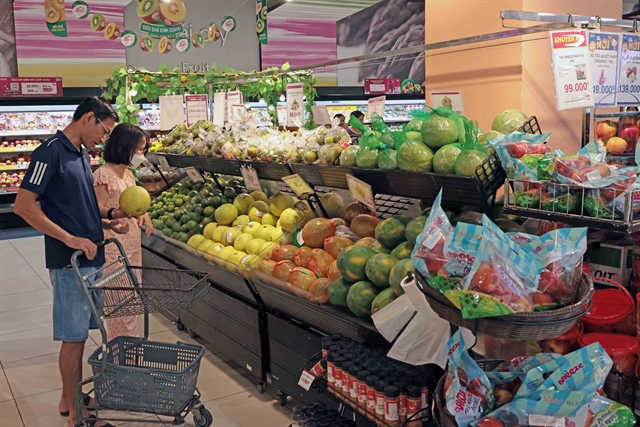.jpg) Economy
Economy


|
| People shop at Aeon Mall in Hà Nội. ADB forecasts Việt Nam's inflation to remain moderate at four per cent for 2024 and 2025. VNA/VNS Photo Trần Việt |
HÀ NỘI — The Asian Development Bank (ADB) projects a positive economic outlook for Việt Nam, forecasting its Gross Domestic Product growth at 6.0 per cent in 2024 and 6.2 per cent in 2025.
According to the Asian Development Outlook (ADO) September, released on Wednesday, inflation will also stay under control.
“Việt Nam’s economy showed robust recovery in the first half of 2024 and continues to maintain momentum despite global uncertainties,” said ADB Country Director for Việt Nam Shantanu Chakraborty. “This steady recovery has been driven by improving industrial production and a strong rebound in trade.”
The industrial sector continues to be a primary driver of growth, with external demand for major electronics fueling production, he added. Việt Nam’s recovery has also been supported by a rebound in the services sector and stable agricultural output. However, domestic demand remains sluggish and subdued global economic prospects add uncertainty.
Inflation is expected to remain moderate at 4.0 per cent for 2024 and 2025, although geopolitical tensions, including the conflict in the Middle East and the Russian 'military operation' in Ukraine, could impact oil prices and potentially boost inflation.
The report highlighted several downside risks that could slow the country’s growth momentum. External demand in major economies will remain weak, while geopolitical tensions and uncertainties related to the US election in November could lead to trade fragmentation, adversely affecting exports, manufacturing activity and employment.
Raising domestic demand will require stronger fiscal stimulus measures such as accelerating public investment implementation, while maintaining low interest rates. Coordinated policy measures are essential to maintain economic recovery, given relative price stability and weak demand. In the near term, looser monetary policy must be closely coordinated with implementing fiscal policy to effectively boost scale but also showcases enhanced product quality, meeting the growing demand of the international market.
Principal Country Economist, ADB Việt Nam Nguyễn Bá Hùng, said trade recovery and positive FDI should be key growth drivers. Exports and imports in the first eight months of 2024 showed strong rebounds of 15.8 and 17.7 per cent, respectively, from the low 8-month base in 2023.
The uncertainty of the continued restructuring of global and regional supply chains hampers trade prospects. Imports and exports will likely grow by over ten per cent this year and slightly higher next year, with the gradual revival of external demand.
Robust trade activity is expected to help maintain the current account surplus estimated at around 2.0 per cent of GDP in 2024. As manufacturing activity returns, pushing up imports of production inputs, the current account balance is projected to narrow to 1.5 per cent of GDP in 2025.
Việt Nam’s monetary policy will continue to aim for both price stability and growth, despite limited policy space. However, the heightened risk of non-performing loans due to continued regulatory relaxation on loan extensions limits the potential for further monetary easing.
Any additional loosening of monetary policy should be closely co-ordinated with an expansionary fiscal policy, along with accelerating institutional reforms to support the economy.
Commenting on the reconstruction of Việt Nam's economy following the severe devastation caused by Typhoon No 3 (Yagi) and its aftermath, Hùng said that leveraging insurance and budget support, particularly through public investment, is essential for effective recovery.
He noted the Vietnamese Government's direct relief package of up to VNĐ350 billion (US$14.2 million), highlighting the collective effort of the population and international partners. Insurance will play a critical role in the asset recovery process, drawing on the example of Hurricane Katrina in 2005, which inflicted approximately $120 billion in economic damage, with the insurance industry covering around $40 billion.
Furthermore, he stressed the importance of budgetary support mechanisms, such as public investment in infrastructure reconstruction and agricultural support following natural disasters, as vital components of the recovery strategy. — VNS